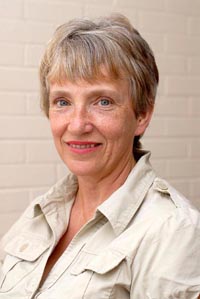First Professor of Hospice Studies appointed

Professor Sheila Payne will become the UK’s first professor of Hospice Studies, at Lancaster University.
Professor Payne’s post, which is the first full time position of its kind in the UK, will be supported over five years by the national charity Help the Hospices. It will be based in the International Observatory on End of Life Care at Lancaster University and will lead on important new research to help improve the lives of the many thousands of patients and families who depend on hospice care every year.
The Observatory – part of the Institute for Health Research - is an International research centre specialising in the development of hospice and palliative care.
Sheila Payne, currently a professor of palliative care at the University of Sheffield, specialises in bereavement, palliative care in cancer and chronic illness. She is a former nurse and health psychologist and worked clinically before going into academia 20 years ago. She has been researching into palliative care since the early 1990’s setting up research groups in the UK. She is also a trustee of St Luke’s Hospice in Sheffield. She will start her new post at Lancaster in October 2006.
Professor Payne sees the UK hospice movement at a crucial stage in its development. The first modern hospice was established in London in 1967 but since then major changes have taken place in the health service and in public attitudes to end of life care.
“I see myself as a critical friend to the hospices, which have been an incredible success story in the UK and replicated world wide. But 30 years on and despite some hospice care being available for people with other diagnoses, hospices are still identified with people dying of cancer. The challenge is to do more to extend all that has been learnt to improve end of life care for all people”.
“I am very interested in how we extend the innovative techniques, in pain control for instance, that have been developed in hospices to the wider population and to more of those suffering from other diseases. I am also interested in how we improve end of life care for the poor and people from different cultures, and encourage a wider cross section of society to make use of the range of support that local hospices can offer.”
Professor Payne is looking forward to working with researchers in different disciplines at Lancaster, including the top-rated management school ( LUMS) in order to improve the training offered to those in hospice management. She is also interested in rural health, and will be looking into how specialist services are delivered in rural areas such as Cumbria, working with Lancaster University’s new Centre for Medical Education.
Key areas of interest to the Professor of Hospice Studies will include:
The role of hospices in the delivery of end of life care in Britain and internationally
Evaluation of the defining characteristics and associated costs of hospice care
The relationships between hospices and their local communities
Future direction of hospice care
Activities that promote the good governance and management of hospices
Ideas, projects and activities that will lead to improvements and change in practice
David Clark, Director of the International Observatory on End of Life Care, said: “Professor Payne’s appointment is very exciting news for Lancaster University and the Observatory and builds on our excellent working relations with Help the Hospices. We are lucky to have appointed someone with a wealth of expertise in this area and I think she will be instrumental in increasing our knowledge on how hospices contribute to the provision of end of life care – and how we can go on improving it.”
David Praill, Chief Executive of Help the Hospices said: “Most hospices are independent local charities, quite rightly focusing on the patients and families in their care and as a result there has been little national research and a lack of data. There are some excellent examples of innovation where hospices are reaching new communities, for example training staff in residential care homes for the elderly and working with people with Motor Neurone Disease and Multiple Sclerosis, and we need to see what has been learned from these. Most of all we need to establish how hospices, working with other organisations, can help to deliver the best care for families, whatever their circumstances. I believe this appointment is an important development in helping to plug the gaps in our knowledge and will assist in informing our future direction. Ultimately we hope it will help hospices to help more people living with terminal illness and their families. We are delighted that Professor Payne and her team are on board.”
The Help the Hospices Chair in Hospice Studies is the first named chair in Lancaster University’s Faculty of Arts and Social Sciences.